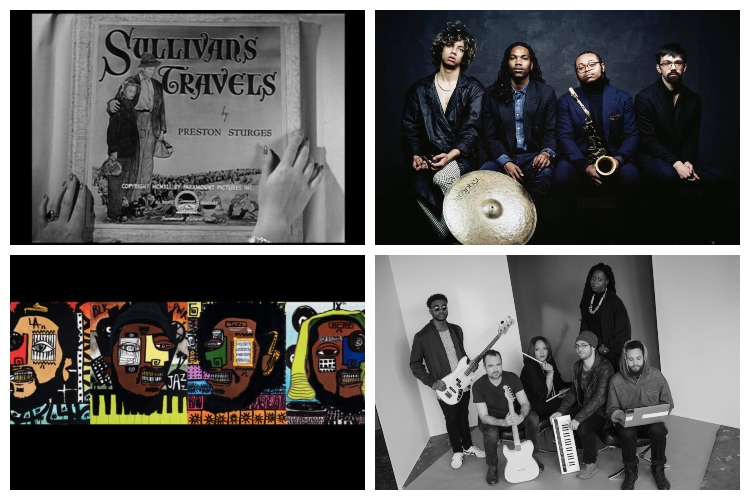Jazz from A to G: The Way In
|
Getting your Trinity Audio player ready...
|
Early on, listening to Led Zeppelin or Jimi Hendrix, jazz was something in another yard, walled-off, and separated from what I was listening to on the radio. It was an idea–segregated by race, primarily, and from behind that wall, everything else in the music stayed hidden.
So when I listened to traditional New Orleans jazz, like The Preservation Hall Jazz Band, it was listening to jazz as a distinct form. I didn’t see the connection that exists between that music and what was on the airwaves. Similarly, my girlfriend at the time tried to introduce me to the tunes of her Black household: Sarah Vaughan, Ella Fitzgerald, Duke Ellington.
Corny, I thought. My ears must have been stuffed with white cotton.
The crossover moment came with, “Nubian Sundance,” by Weather Report (Mysterious Traveller (Legacy, 1974)), a band that featured Joe Zawinul and Wayne Shorter. It was modern and rhythmic, urgent and easy to embrace. The implicit politics of the song, with the crowd roaring, suggested that soon enough the old would be seen for what it was: Outdated.
Jazz that brought in sounds familiar to me joined my playlist: Mongo Santamaria, Stanley Turrentine, and George Benson, among others. It was music that fit into my small teenage experience, it didn’t take me to any new places, it felt like rock and roll because it was predictable, I knew what would come next in the songs it was reassuring, it wasn’t about change. It was like peeking over the wall and then going back to my own yard.
But rock and roll was what brought me deeper into jazz. When I put on, “Shipbuilding,” by Elvis Costello (Punch the Clock, Columbia (1983)), and heard a long trumpet solo, I thought, “What is that?” It was better than anything else about the song musically. Better than the entire album. Though the lyrics of “Shipbuilding,” are remarkable, the haunting, pained ambiguity of that trumpet made me think and feel in ways unfamiliar to me.
I felt estranged, I felt lonely, and then I wasn’t sure what I felt–something about what I heard was new. It wasn’t music to get away from life, or celebrate life, it wasn’t about pain either. What I felt was a strange mix of acceptance of peace, solitude, and sadness. The plangent sounds seemed to be a cry to join in and to accept the power of loneliness. To see that loneliness is a blessed perspective to observe and embrace life.
Dude, it was heavy.
Of course, that man on the trumpet was Chet Baker. I picked up everything I could by him, and when I saw, Let’s Get Lost (New Video Group, 1989), the movie of his life, the sad ferocity of his art had an originality that made me want to feel and think more in ways that Led Zeppelin ever did.
But it wasn’t that there was no mingling–The false separability or segregation between genres breaks down. “Waiting on a Friend” (Tattoo You (Self-Release, 1989)) by the Stones, features Sonny Rollins and, once again, keeping ears and heart and mind open, his tenor sax solo tears apart the song.
That’s the key, that’s where the walls come down: The sound getting into my awareness, shaping my thoughts, and allowing me to feel more deeply.
Once the cotton was out of my ears, the music got in.
I’m on Mem Drive, heading to Charlestown [Massachusetts], and the rain is so heavy the wipers can’t keep up. A jazz show on WERS plays a tune, one I’d never heard before. It’s so beautiful that I pull over, knowing I’ll be late to work, just so that I can hear the DJ identify it after it’s over. No ID so later I call the station.
“You know that song you played at 8:37? What was that?”
“Someday My Prince Will Come,” Miles Davis.
It’s out there, all of it, waiting to be discovered when you jump over the wall.
This summer there are new releases from Joshua Redman, Billy Childs, and Chick Corea, among others, and listening in, some of what you hear will be familiar, and some of it will be new.
Redman brought together his original quartet, with himself on saxophone, Brad Mehldau on piano, Christian McBride on bass, and Brian Blade on drums. RoundAgain (Nonesuch, 2020) shows how musicians, long accustomed to playing together, create new sounds while adding to what brought them together in the first place. In that sense, it’s inspiring: Relationships are never static.
Childs’ new recording, Acceptance (Mack Avenue, 2020) creates space for the listener–he integrates vocals in his music like few others. And he’s fearless in terms of what is and isn’t jazz; An earlier album was made up of the songs of Laura Nyro.
And Corea keeps changing. His new 2-CD release, Chick Corea Plays (Concord, 2020) in September is well-defined and explicit in terms of where he continues his journey.
“When I first played a Scarlatti sonata in front of my jazz audience, it broadened the whole scope of what I was presenting,” Corea writes on his website. “To me it fit so well, but I found that, to audiences, it was a little unusual for me to put together a Mozart piece with a Gershwin tune. What do Mozart and Gershwin have to do with one another? That’s up to you as a listener, but they’re analogous to me.”
Never mind what it is, the issue is: How do you feel listening to it?
A famous French writer ended his most famous novel by having his hero express astonishment that the woman he married, “wasn’t even his type.” But once he accepted the reality of his emotions and intellect, what appealed to him was no longer hidden.
Of course, music is like that, too.
Redman-Mehldau-McBride-Blade’s Round Again is now available on Nonesuch Records. If you would like to purchase it while supporting our site, it is available in our Amazon affiliate store.
Billy Childs’ Acceptance will be released on August 28, 2020 by Mack Avenue. It is available for pre-order in our Amazon affiliate store.


 Scott Haas’ latest book, “Why Be Happy?: The Japanese Way of Acceptance” is available in our Amazon affiliate store.
Scott Haas’ latest book, “Why Be Happy?: The Japanese Way of Acceptance” is available in our Amazon affiliate store.
I followed a rabbit hole and found a nice warm fuzzy den.